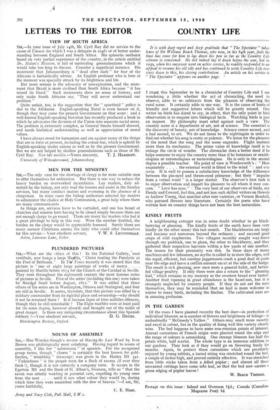COUNTRY LIFE
It is with deep regret and deep gratitude that "The Spectator" takes leave of Sir William Beach Thomas, who now, in his .84th year, feels the time has come for him to lav down his pen so far as the Country Life column is concerned. He did indeed lay it down before the war, but in 1939, when his successor went on active service, he readily responded to an appeal to resume his old role and has continued to write Country Life ever since down to this, his closing contribution. As article on his service to "The Spectator" appears on another page. • I CEASE this September to be a chronicler of Country Life and I am wondering a little whether the act of chronicling, the need to observe, adds to or. subtracts from the pleasure of observing the rural scene. It certainly adds in one way. It is the cause of hosts of friendly and suggestive letters which will be greatly missed. One writer on birds has dared to say, in effect, that the only point in bird observation is to enquire into biological facts. Watching birds is just an inquest. My philosophy must rebel against such a view. The country scene is a department of art, not of science. The essential is the discovery of beauty, not of knowledge. Science comes second, and a bad second, to art. We do not listen to the nightingale in order to find out whether his song is erotic or polemic. We listen for the pleasure of the mood that the song and the scene engender. Flight matters more than its mechanics. The prime value of knowledge itself is to enlarge the circle of wonder. The chronicler does a better deed if he helps someone to enjoy the country more than if he botanises or omith- ologises or entomologises or meteorologises. He is only in the second degree a possible teacher. His point of view is Wordsworth's : "How exquisitely . . . . the external world is fitted to the mind " ; and vice versa. It is well to possess a satisfactory knowledge of the difference between the pin-eyed and thrum-eyed primrose; but their "impulse from a vernal wood" is a larger matter. The observer's first task is to enjoy observation and impart his pleasure to all whom it may con-
cern. Love has eyes." The very best of our observers of birds, say Hendy and Coward, feel this, and not less such skilled writers on flowers as Andrew Young, that searcher after rare varieties, or Vernon Rendall, who pursued flowers into literature. Certainly the poets who have written best on country things have not been the best naturalists.






















 Previous page
Previous page